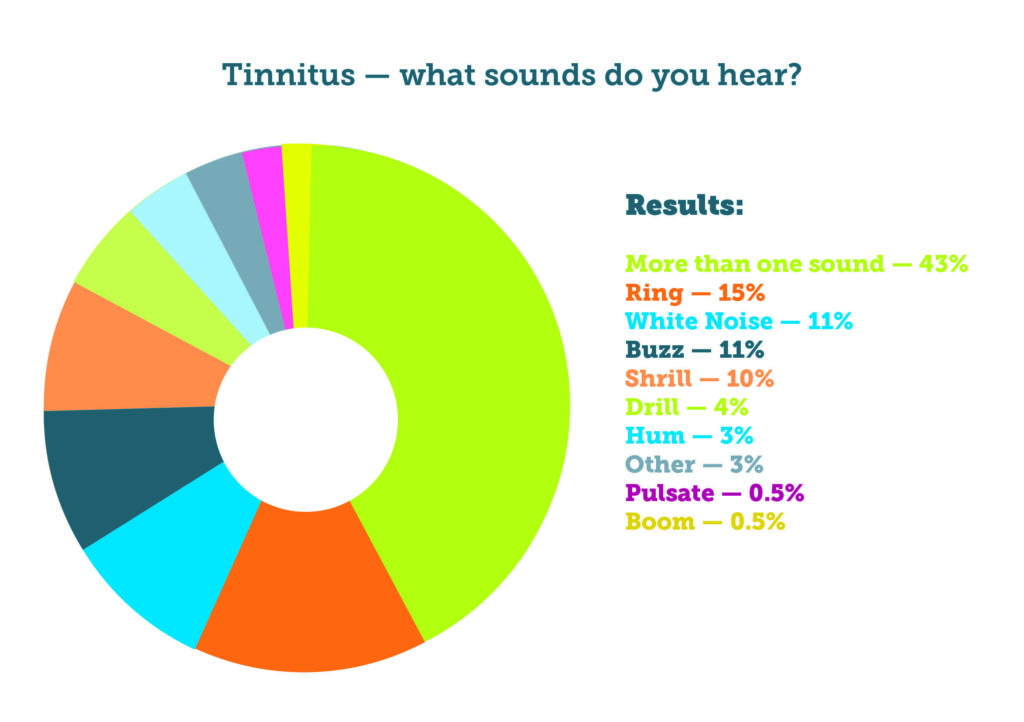What is tinnitus?
Tinnitus definition
Tinnitus is an awareness of sound in the ears or head which is not from an external source. There are many different types of tinnitus sounds. Common descriptions are that it is a hiss, whistle, whirr, ring or buzz. Occasionally, it can be segments of music. The pitch can be high or low and the level can vary over time.
How common is tinnitus?
In its mildest form, tinnitus is extremely common and many people experience occasional sounds in their ears, for example after being in a noisy place such as a concert. An estimated 10% of the UK adult population experience tinnitus frequently. Around 5% find it affects their quality of life.
Types of tinnitus
There is two main types: subjective and objective tinnitus.
- Subjective: This can be heard only by the person. It is by far the most common type of tinnitus.
- Objective: This can be heard by somebody examining the person and is very uncommon. It can be caused by a variety of physical effects such as spasm of the tiny muscles in the middle ear, abnormalities in the blood vessels or increased blood flow to the ear.
Tinnitus sounds
Produced by Tinnitus Talk Support Forum (video hosted by British Tinnitus Association)
What is tinnitus like?
During Tinnitus Awareness Week, Hearing Link ran an online poll asking people to describe the sounds they hear. From buzzing to booming, white noise to high pitched shrill sounds, drilling to pulsating, a wide repertoire of sounds were reported. The table below shows some of our findings.
Sounds people hear |
|---|
 |
More unusual experiences |
|---|
 |
Causes of tinnitus
Whatever the trigger for tinnitus, it causes a change to the transmission of the signal going from the ear to the part of the brain where the sound is processed, known as the auditory cortex. This means that some parts of the auditory cortex do not receive signals as they used to. In some people, this area reacts by developing spontaneous ‘chatter’, which becomes synchronized to create the illusion of sound. Over time, this firing pattern is strengthened and the tinnitus can become a constant sound.
The following factors are known to be involved in the development of tinnitus:
1. Hearing loss
Tinnitus often occurs along with some degree of hearing loss. But around one in every three people with tinnitus does not have any problem with their hearing.
2. Exposure to loud noise
Noise is one of the most common causes of hearing loss. A single incident experienced at close range may permanently damage your hearing in an instant. Repeated exposures to loud noise over an extended period of time present serious risks to human hearing.
3. Injury to the ears or head
For more than one in ten suffering chronic tinnitus the problem stems from a neck or head injury.
4. Ear infection
Any ear infection can cause blockage of hearing, and so make the occurrence of tinnitus more likely.
5. Disease of the ear
There are several diseases of the ear that can occur in an otherwise healthy person, all of which can cause hearing loss and so make the occurrence of tinnitus more likely.
6. Side effect of medication
Certain medications, both prescription and over the counter, can cause tinnitus. Tinnitus is cited as a potential side effect for about 200 prescription and non-prescription drugs.
 7. Emotional stress
7. Emotional stress
How you manage your tinnitus may have a connection with the level of stress you are under. If you have a high level of stress there is a greater chance that you will be troubled by your tinnitus.
Comments
Post a Comment